
George FridericHandel was a German-British Baroque composer well-known for his operas, oratorios, anthems, concerti grossi, and organ concertos. Handel received his training in Halle and worked as a composer in Hamburg and Italy before settling in London in 1712, where he spent the bulk of his career and became a naturalised British subject in 1727. He was strongly influenced both by the middle-German polyphonic choral tradition and by composers of the Italian Baroque. In turn, Handel's music forms one of the peaks of the "high baroque" style, bringing Italian opera to its highest development, creating the genres of English oratorio and organ concerto, and introducing a new style into English church music. He is consistently recognized as one of the greatest composers of his age.

Lancaster is a city in Lancashire, England, and the main cultural hub, economic and commercial centre of City of Lancaster district. The city is on the River Lune, directly inland from Morecambe Bay. Lancaster is the county town, although Lancashire County Council has been based at County Hall in Preston since its formation in 1889.

In music, the organ is a keyboard instrument of one or more pipe divisions or other means for producing tones. The organs have usually two or three, up to five, manuals for playing with the hands and a pedalboard for playing with the feet. With the use of registers, several groups of pipes can be connected to one manual.

A barrel organ is a French mechanical musical instrument consisting of bellows and one or more ranks of pipes housed in a case, usually of wood, and often highly decorated. The basic principle is the same as a traditional pipe organ, but rather than being played by an organist, the barrel organ is activated either by a person turning a crank, or by clockwork driven by weights or springs. The pieces of music are encoded onto wooden barrels, which are analogous to the keyboard of the traditional pipe organ. A person who plays a barrel organ is known as an organ grinder.
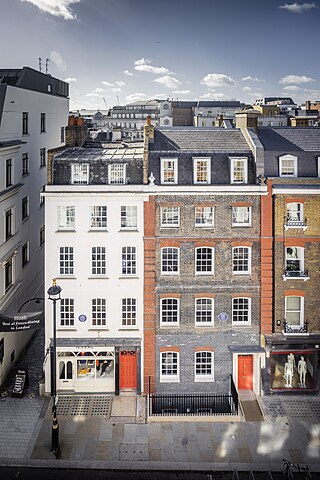
Handel Hendrix House is a museum in Mayfair, London, dedicated to the lives and works of the German-born British baroque composer George Frideric Handel and the American rock singer-guitarist Jimi Hendrix, who lived at 25 and 23 Brook Street respectively.

Clitheroe Castle is a ruined early medieval castle in Clitheroe in Lancashire, England. It was the caput of the Honour of Clitheroe, a vast estate stretching along the western side of the Pennines.

John Christopher Smith was an English composer who, following in his father's footsteps, became George Frideric Handel's secretary, student and amanuensis.

Finchcocks is an early Georgian manor house in Goudhurst, Kent. For 45 years it housed a large, visitor-friendly museum of historical keyboard instruments, displaying a collection of harpsichords, clavichords, fortepianos, square pianos, organs and other musical instruments. The museum was run by the owners of the house, Richard and Katrina Burnett until 2017. It is now owned by Neil and Harriet Nichols who use it as a family home and a venue for residential piano courses and classical concerts.

Alexander's Feast is an ode with music by George Frideric Handel set to a libretto by Newburgh Hamilton. Hamilton adapted his libretto from John Dryden's ode Alexander's Feast, or the Power of Music (1697) which had been written to celebrate Saint Cecilia's Day. Jeremiah Clarke set the original ode to music.
John Walsh was the name of a father and son, two printers and publishers of music, active in London from the late 17th Century, and through the first half of the 18th Century. They published much important Baroque music, including works by William Babell and George Frideric Handel.

The Handel organ concertos, Op. 4, HWV 289–294, are six organ concertos for chamber organ and orchestra composed by George Frideric Handel in London between 1735 and 1736 and published in 1738 by the printing company of John Walsh. Written as interludes in performances of oratorios in Covent Garden, they were the first works of their kind for this combination of instruments and served as a model for later composers.
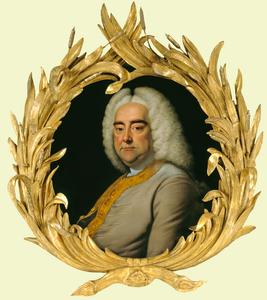
The Handel organ concertos, Op. 7, HWV 306–311, refer to the six organ concertos for organ and orchestra composed by George Frideric Handel in London between 1740 and 1751, published posthumously in 1761 by the printing company of John Walsh. They were written for performance during Handel's oratorios, contain almost entirely original material, including some of his most popular and inspired movements.
A fine and delicate touch, a volant finger, and a ready delivery of passages the most difficult, are the praise of inferior artists: they were not noticed in Handel, whose excellencies were of a far superior kind; and his amazing command of the instrument, the fullness of his harmony, the grandeur and dignity of his style, the copiousness of his imagination, and the fertility of his invention were qualities that absorbed every inferior attainment. When he gave a concerto, his method in general was to introduce it with a voluntary movement on the diapasons, which stole on the ear in a slow and solemn progression; the harmony close wrought, and as full as could possibly be expressed; the passages concatenated with stupendous art, the whole at the same time being perfectly intelligible, and carrying the appearance of great simplicity. This kind of prelude was succeeded by the concerto itself, which he executed with a degree of spirit and firmness that no one ever pretended to equal.

Solos for a German Flute a Hoboy or Violin with a Thorough Bass for the Harpsichord or Bass Violin Compos'd by Mr. Handel was published by John Walsh in 1732. It contains a set of twelve sonatas, for various instruments, composed by George Frideric Handel. The 63 page publication includes the sonatas that are generally known as Handel's Opus 1.

St John the Evangelist's Church is a redundant Anglican church in North Road, Lancaster, Lancashire, England. It is recorded in the National Heritage List for England as a designated Grade II* listed building, and is under the care of the Churches Conservation Trust.
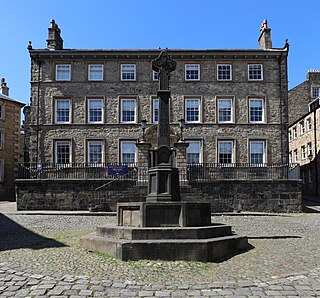
The Judges' Lodgings, formerly a town house and now a museum, is located between Church Street and Castle Hill, Lancaster, Lancashire, England. It is recorded in the National Heritage List for England as a designated Grade I listed building. The building is the oldest existing town house in Lancaster, and was also the first house in Lancaster to have shutters. It was used by judges when they attended the sessions of the Assize Court.

Bruce James Talbert was a Scottish architect, interior designer and author, best known for his furniture designs.

Abraham Rawlinson was an English politician and merchant. He came from a prominent Quaker family which traded out of the port of Lancaster. Rawlinson served as one of two Members of Parliament for Lancaster from 1780 to 1790. Abraham Rawlinson was the son of Thomas Hutton Rawlinson (1712–69), a slave trader, and his wife Mary. He took over his father's business in 1756, creating a new company Abraham Rawlinson Junr. & Co. Rawlinson was involved in the importation of mahogany, and in the slave trade.

The Lady's workbox in the Judges' Lodgings Museum, Lancaster, was made in 1808 in Lancaster by Gillows.
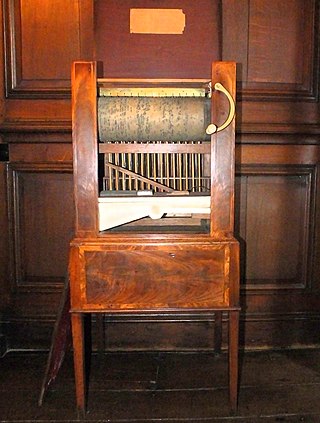
John Langshaw (1725–1798) was an English organist and an organ-builder. Leaving organ cases to others, he specialised in the mechanics, in particular those of chamber barrel organs. He left his native Lancashire to work in London, but returned to Lancashire in 1770.
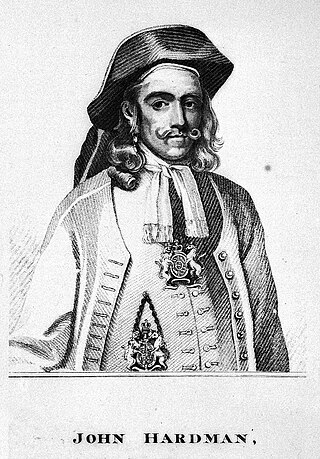
John Hardman was an English merchant and slave trader from Lancashire, England, who was elected as Member of Parliament (MP) for Liverpool in 1754. He and his brother were the owners of Allerton Hall during the 17th century and are believed to have been involved in 46 slave voyages from 1729 to 1761.



















